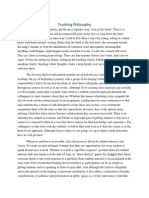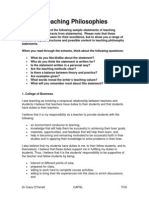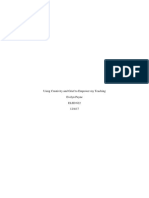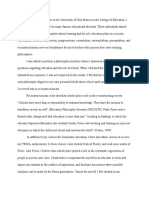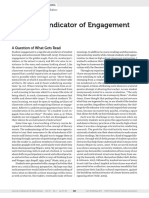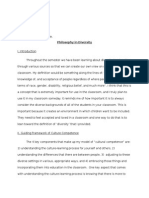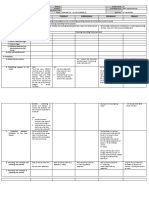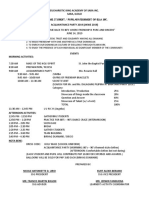Heather Anne Trahan Teaching Philosophy Creating A Community
Heather Anne Trahan Teaching Philosophy Creating A Community
Uploaded by
trahanheatherCopyright:
Available Formats
Heather Anne Trahan Teaching Philosophy Creating A Community
Heather Anne Trahan Teaching Philosophy Creating A Community
Uploaded by
trahanheatherOriginal Title
Copyright
Available Formats
Share this document
Did you find this document useful?
Is this content inappropriate?
Copyright:
Available Formats
Heather Anne Trahan Teaching Philosophy Creating A Community
Heather Anne Trahan Teaching Philosophy Creating A Community
Uploaded by
trahanheatherCopyright:
Available Formats
Heather Anne Trahan Teaching Philosophy ~Creating a Community~ For a few minutes before every class meeting, I take
the time to center myself, and silently repeat the question: I wonder what Ill learn from my students today? In asking this, I remind myself that education is never handed down, from on high, from me to them. Rather, we co-create a learning experience together. Learning is always reciprocal and it is always in motion. My teaching philosophies are inspired by many radical teachers who came before me, who set down a path and guided me to a place of wonder, curiosity, patience, humility, compassion, and a willingness to engage (and not gloss over or rush past) the tension-filled moments. For it is within tensionas well paradox and mysterythat holds the real root of learning. When human beings are faced with ideas that do not align, or that confuse, or that mystify, that is when the questions beginand it is through the asking of questions (not necessarily in the answering of them) that we learn. When I walk into the classroom, I feel exhilarated by continuing in the tradition of: Paulo Freire, with his challenging map for creating dialogue; bell hooks, with her surprising ideas about love; and, Parker Palmer, with his theory of education as a practice for freedom. These three pedagogues in particular have helped me to understand writing as a tool that has the capacity to bring about systemic societal change. These teachers have helped me see that these ideasdialogue, love, freedomare not just silly clichs. Rather, dialogue, love, and freedom are the basis of any educational course, curricula, or institution that aims to light the fires of wisdom. What I desire for writing students is to compose as a method for not only critiquing what social norms dictate that they should be and should do but, also, I desire them to use composing as a way for them to actively create alternative social models. In other words, I dont just want students to stay stuck in critique. I dont want them just to be able to, for example, perceive heteronormativity. I want my students to travel beyond that, and create thought-models for other ways of being that cultivate values of diversity, wonder, compassion, and empathy. Through undertaking the process of engaged ethical writing, some students leave my classroom able to communicate with others, make decisions, and take action no longer merely by default. Language is used for intentionality. Through a more fluent utilization of discourse, empowered learners discover and often invent new paths for themselves as well as define new forms of success. My writing courses are often composed of three main forms of activity: small discussion groups, student-lead whole class discussions, and silent writing time. I do not see myself as The One Who Lectures. The word educate comes from the Latin educere, meaning to draw out. This etymology informs my role as a Co-Learner who draws out questions and insights from an often incoherent, unexamined internal voice into a more coherent, reflective external voice onto the page. I have no desire to impose any truths or facts on students from the outside; rather, I create a loving space conducive to students being able to reach within themselves, assisting them in drawing out what it is they understand and can do, each based on their own subjective histories. Something I do daily in the classroom is to provide rationale whenever I ask my students to do something. I am not The Boss. I am, instead, The Explainer who explains the connections, reasons, and motives behind even seemingly small requests. For example, if I ask my students to
bring a particular textbook to class every Friday, I let them know why having that particular textbook will potentially enhance the group dialogues we will be having. Another aspect thats crucial to my ethos as a teacher is, whenever possible, I will do what my students are doing while they are doing it. So, if I ask them to take ten minutes of class time to write a short reflection on the homework reading that was assigned for the day, then I will write, too, alongside them. My pen will move as their pens move. My laptop will be open as their laptops are open. Then, when its time to share writing, I will present my own work to them, no matter if my thoughts on the page turned out messy or not. This ethic of both providing rationale and doing what I ask them to do is my way of communicating the message: We are a community; we are in this together. My courses are truly student-centered and student-directed, with a spirit of as much egalitarianism as is possible while abiding by the particular institution and the particular departments goals within which I work. In the writing courses I facilitate, students have a great deal of responsibility. Students have open access to my guidance when they request it, but I also make sure to provide the needed intellectual, emotional, and spiritual space to question, wonder, risk, and even resist. Thus, the classroom becomes a place not only for skills acquisition but also for movement and transformation, with that transformation being, ultimately, the responsibility of each student.
You might also like
- Saxon Math Course 1 Workbook PDFDocument8 pagesSaxon Math Course 1 Workbook PDFafjwftijfbwmen43% (7)
- Educational Philosophy Assignment PDFDocument4 pagesEducational Philosophy Assignment PDFapi-239228406100% (1)
- LP Over and Under The SnowDocument5 pagesLP Over and Under The Snowapi-311345739No ratings yet
- TANCET Entrance ME EEE, ECE, CSE Exam Book OnlineDocument3 pagesTANCET Entrance ME EEE, ECE, CSE Exam Book Onlinesura books100% (1)
- Not Teaching Ethics ArticleDocument3 pagesNot Teaching Ethics ArticleYeni CodigoNo ratings yet
- Notice That They Were Dominating The Discussion? What Else Was I Missing?Document11 pagesNotice That They Were Dominating The Discussion? What Else Was I Missing?api-335106108No ratings yet
- Philosophy THDocument2 pagesPhilosophy THapi-473126954No ratings yet
- 991-Article Text-2693-1-10-20170404 PDFDocument19 pages991-Article Text-2693-1-10-20170404 PDFBVS CollegesNo ratings yet
- Teaching PhilosophyDocument3 pagesTeaching Philosophyapi-302848269No ratings yet
- The Examined LifeDocument6 pagesThe Examined LifeJessica AnneNo ratings yet
- Edu 202 Educational Philosophy PaperDocument8 pagesEdu 202 Educational Philosophy Paperapi-322892460No ratings yet
- Szabady Teaching PhilosophyDocument2 pagesSzabady Teaching PhilosophyglszabadyNo ratings yet
- Developing A Personal Approach To Classroom PracticesDocument9 pagesDeveloping A Personal Approach To Classroom Practicesapi-286891478No ratings yet
- Describe Teaching ExperienceDocument2 pagesDescribe Teaching ExperienceTristan BabaylanNo ratings yet
- Teachhing Philosophy and GoalDocument3 pagesTeachhing Philosophy and GoalOluwaseun ErnestNo ratings yet
- Teachphil EnsinarsemlivrosDocument12 pagesTeachphil EnsinarsemlivrosLeonardo PortoNo ratings yet
- Sembrano, Joy SDocument2 pagesSembrano, Joy SjulietmmonleonNo ratings yet
- Bellhooks CriticalThinkingDocument3 pagesBellhooks CriticalThinkingAnthony DoNo ratings yet
- Teaching Philosophy - Patterson, Gina PDFDocument2 pagesTeaching Philosophy - Patterson, Gina PDFdrgpatNo ratings yet
- Sample Teaching PhilosophiesDocument12 pagesSample Teaching PhilosophiesArdi Do100% (1)
- Educational PhilosophersDocument9 pagesEducational Philosophersapi-418534829No ratings yet
- Educational PhilosophyDocument4 pagesEducational Philosophyapi-283617543No ratings yet
- ReflectionDocument6 pagesReflectionTara Della RoccaNo ratings yet
- Personal Education Philosophy PaperDocument4 pagesPersonal Education Philosophy Paperapi-316502259No ratings yet
- Educ 250 My Philosophy of EducationDocument4 pagesEduc 250 My Philosophy of Educationapi-285426028No ratings yet
- EdphilstatementDocument5 pagesEdphilstatementapi-341994447No ratings yet
- My Educational PhilosophyDocument6 pagesMy Educational Philosophyapi-218061588No ratings yet
- My Philosophy On EducationDocument6 pagesMy Philosophy On Educationapi-384475595No ratings yet
- TeachingphilosophyDocument2 pagesTeachingphilosophyapi-300255940No ratings yet
- Tutoring Philosophy StatementDocument12 pagesTutoring Philosophy StatementBWeston1No ratings yet
- In What Ways Is Teaching Important - What Are Your Values, Beliefs and Current Philosophy Concerning Teaching and LearningDocument4 pagesIn What Ways Is Teaching Important - What Are Your Values, Beliefs and Current Philosophy Concerning Teaching and LearningiteachfromheartNo ratings yet
- Final-Output Marlou VaenzuelaDocument1 pageFinal-Output Marlou VaenzuelaMarlou ValenzuelaNo ratings yet
- Teaching PhilosophyDocument3 pagesTeaching Philosophyoscarin9012No ratings yet
- Philosophy of Education FinalDocument7 pagesPhilosophy of Education Finalapi-301781586No ratings yet
- Spring Reflection Artifact - Peer Educator Discussion PostsDocument6 pagesSpring Reflection Artifact - Peer Educator Discussion Postsapi-515727591No ratings yet
- Using Creativity and Grief To Empower My Teaching Evelyn Payne ELED 622 12/4/17Document19 pagesUsing Creativity and Grief To Empower My Teaching Evelyn Payne ELED 622 12/4/17api-316502259No ratings yet
- Ubd ReflectionDocument8 pagesUbd Reflectionapi-292434666No ratings yet
- Galat-Teaching PhilosophyDocument2 pagesGalat-Teaching PhilosophyJoshua GalatNo ratings yet
- Postmodernist Philosophy PaperDocument7 pagesPostmodernist Philosophy PaperRose KleinNo ratings yet
- Dan Weijers Teaching Portfolio 14 Nov 2013Document49 pagesDan Weijers Teaching Portfolio 14 Nov 2013api-244643820No ratings yet
- Philosophy ReflectionDocument4 pagesPhilosophy ReflectionVeronica Martinez100% (1)
- A Rainbow-Colored CurriculumDocument7 pagesA Rainbow-Colored Curriculumapi-241890382No ratings yet
- Teaching PhilosophyDocument2 pagesTeaching Philosophyapi-279778192No ratings yet
- Personal Philosophy of Education PaperDocument6 pagesPersonal Philosophy of Education Paperapi-327064630No ratings yet
- Teaching PhilosophyDocument1 pageTeaching PhilosophyBenjamin WinterNo ratings yet
- Jesse Costello 2014 Etec 530 Self-Reflection Research Cafe AssignmentDocument5 pagesJesse Costello 2014 Etec 530 Self-Reflection Research Cafe Assignmentapi-283556768No ratings yet
- Classroom Management PlanDocument6 pagesClassroom Management Planandreaholliday07No ratings yet
- Bourassa Summative PlanDocument6 pagesBourassa Summative Planapi-202385200No ratings yet
- Philosophy of EducationDocument2 pagesPhilosophy of EducationCarla WellbornNo ratings yet
- Final Weebly Section 2 Msed Elementary Portfolio ProjectDocument31 pagesFinal Weebly Section 2 Msed Elementary Portfolio Projectapi-365647106No ratings yet
- The Open ClassroomDocument45 pagesThe Open ClassroomShams JhugrooNo ratings yet
- Phil of EdDocument1 pagePhil of Edapi-282809920No ratings yet
- Silence As Indicator of Engagement: Yolanda MajorsDocument3 pagesSilence As Indicator of Engagement: Yolanda MajorsAbhishek SinghNo ratings yet
- Circle Time Literature ReviewDocument6 pagesCircle Time Literature Reviewafmzkbuvlmmhqq100% (1)
- Ed698framingstatement11classroommanagment VonnahmeDocument9 pagesEd698framingstatement11classroommanagment Vonnahmeapi-742989488No ratings yet
- Case StudiesDocument17 pagesCase StudiesSanjay DuraiNo ratings yet
- Philosophy PaperDocument11 pagesPhilosophy Paperapi-363092081No ratings yet
- Critical and Feminist Educational PhilosophyDocument5 pagesCritical and Feminist Educational Philosophyapi-354685488No ratings yet
- Philosophy Paper 1Document4 pagesPhilosophy Paper 1api-585782094No ratings yet
- Module 7 Assignment My Philosophy of Education 1Document2 pagesModule 7 Assignment My Philosophy of Education 1api-666573738No ratings yet
- Philosophy in Diversity PaperDocument6 pagesPhilosophy in Diversity Paperapi-273379527No ratings yet
- GRADES 1 To 12 Daily Lesson LogDocument6 pagesGRADES 1 To 12 Daily Lesson LogRhoseNo ratings yet
- AAS 20 Sylabus Spring 2017 FINALDocument6 pagesAAS 20 Sylabus Spring 2017 FINALZi Wei ZNo ratings yet
- Ejercicios para Dar Direcciones PDFDocument4 pagesEjercicios para Dar Direcciones PDFJaime Gonzalez0% (1)
- Chapter 2 (g12)Document4 pagesChapter 2 (g12)Kyle Ambis SyNo ratings yet
- International Islamic University Chittagong Application Form For AdmissionDocument4 pagesInternational Islamic University Chittagong Application Form For AdmissionM. DuttaNo ratings yet
- Proposed Lac Plan 2021-2022Document9 pagesProposed Lac Plan 2021-2022Kelvin Lansang100% (1)
- Mathematics 5-Q3-w4Document24 pagesMathematics 5-Q3-w4antonette100% (1)
- E Importance of Studying RizalDocument2 pagesE Importance of Studying RizalBig_vain67% (3)
- Rating Sheet For Demo TeachingDocument3 pagesRating Sheet For Demo TeachingMark Robel Torreña100% (5)
- English-Research Project EssayDocument5 pagesEnglish-Research Project Essayapi-383390908No ratings yet
- Possess A Burning Desire For SuccessDocument7 pagesPossess A Burning Desire For SuccessJanetStuartNo ratings yet
- SPARKPLUGS Local Government Academy - Luzon Urban BeltwayDocument127 pagesSPARKPLUGS Local Government Academy - Luzon Urban BeltwayAldrich Roswell OnaNo ratings yet
- Eucharistic King Academy of Sara Inc. Sara, Iloilo: ObjectivesDocument2 pagesEucharistic King Academy of Sara Inc. Sara, Iloilo: Objectivesfranix dizonNo ratings yet
- FY 2009 City Council Adopted Expense Budget Schedule CDocument246 pagesFY 2009 City Council Adopted Expense Budget Schedule CConnaissableNo ratings yet
- Chicago Public Schools Letter To WBEZ Regarding Special Education ReportDocument7 pagesChicago Public Schools Letter To WBEZ Regarding Special Education ReportChicago Public MediaNo ratings yet
- Lesson Plan With ModificationsDocument2 pagesLesson Plan With Modificationsapi-250116205No ratings yet
- Equivalenc Board List 2018Document6 pagesEquivalenc Board List 2018Dillip HansdahNo ratings yet
- Dll-Tle 10 - Events Management - Co1Document6 pagesDll-Tle 10 - Events Management - Co1Freddie S. GalitNo ratings yet
- Note Taking JigsawDocument5 pagesNote Taking Jigsawapi-242127878100% (1)
- Course Outline 2020SS and NotesDocument17 pagesCourse Outline 2020SS and NotesCindy YinNo ratings yet
- AP Euro DBQ RubricDocument1 pageAP Euro DBQ RubricKeith NealNo ratings yet
- Complete Spanish Transcript - (September 5 2017)Document481 pagesComplete Spanish Transcript - (September 5 2017)Mihalis EleftheriouNo ratings yet
- Workbook - Approaches To Learning (MYP Workshop Category 3)Document109 pagesWorkbook - Approaches To Learning (MYP Workshop Category 3)Domm Garcia100% (3)
- Lucid DreamsDocument3 pagesLucid DreamsJuanfe29No ratings yet
- Prof - Ed - 105Document12 pagesProf - Ed - 105cecilbayudNo ratings yet
- Narrative Strategies in The Novels of Erich Maria Remarque: A Focus On PerspectiveDocument5 pagesNarrative Strategies in The Novels of Erich Maria Remarque: A Focus On PerspectivetijouNo ratings yet
- Table of Specification Organic Farming Elective Periodical Exam First SemesterDocument1 pageTable of Specification Organic Farming Elective Periodical Exam First SemesterJayson Balajadia100% (1)











